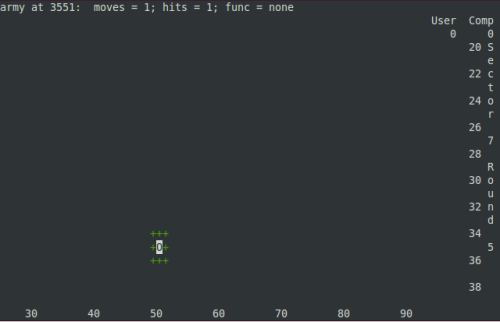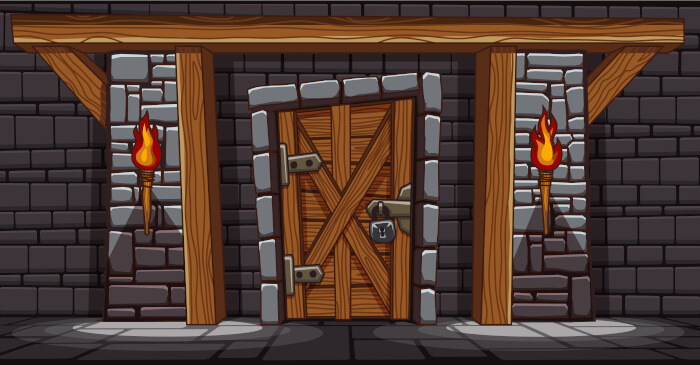Empire is a console game simulation of a full-scale war between two emperors, the computer and you. Naturally, there is only room for one, so the object of the game is to destroy the other.
The world on which the game takes place is a square rectangle containing cities, land, and water. Cities are used to build armies, planes, and ships which can move across the world destroying enemy pieces, exploring, and capturing more cities.
Empire is a war game played between you and the user. The world on which the game takes place is a square rectangle containing cities, land, and water. Cities are used to build armies, planes, and ships which can move across the world destroying enemy pieces, exploring, and capturing more cities. The objective of the game is to destroy all the enemy pieces, and capture all the cities.
The world is a rectangle 60 by 100 squares on a side. The world consists of sea (.), land (+), uncontrolled cities (*), computer-controlled cities (X), and cities that you control (O).
The world is displayed on the player’s screen during movement. (On terminals with small screens, only a portion of the world is shown at any one time.) Each piece is represented by a unique character on the map. With a few exceptions, you can only have one piece on a given location. On the map, you are shown only the 8 squares adjacent to your units. This information is updated before and during each of your moves. The map displays the most recent information known.
The game starts by assigning you one city and the computer one city. Citiescan produce new pieces. Every city that you own produces more pieces for you according to the cost of the desired piece. The typical play of the game is to issue the Automove command until you decide to do something special. During movement in each round, the player is prompted to move each piece that does not otherwise have an assigned function.
The classic game from the 1980s uses text mode graphical output, drawing your units, cities and the world in color. Commands are issued using they keyboard.
Features include:
- 100 different difficulty levels.
- Most aspects of the game are “real time”.
- Games can last a day or many months.
- Extremely complex.
Website: www.wolfpackempire.com
Support: FAQ
Developer: Dave Pare, Jeff Bailey, Thomas Ruschak, Ken Stevens, Steve McClure, Markus Armbruster, and many others
License: GNU General Public License v3.0

| Popular series | |
|---|---|
| The largest compilation of the best free and open source software in the universe. Each article is supplied with a legendary ratings chart helping you to make informed decisions. | |
| Hundreds of in-depth reviews offering our unbiased and expert opinion on software. We offer helpful and impartial information. | |
| The Big List of Active Linux Distros is a large compilation of actively developed Linux distributions. | |
| Replace proprietary software with open source alternatives: Google, Microsoft, Apple, Adobe, IBM, Autodesk, Oracle, Atlassian, Corel, Cisco, Intuit, SAS, Progress, Salesforce, and Citrix | |
| Awesome Free Linux Games Tools showcases a series of tools that making gaming on Linux a more pleasurable experience. This is a new series. | |
| Machine Learning explores practical applications of machine learning and deep learning from a Linux perspective. We've written reviews of more than 40 self-hosted apps. All are free and open source. | |
| New to Linux? Read our Linux for Starters series. We start right at the basics and teach you everything you need to know to get started with Linux. | |
| Alternatives to popular CLI tools showcases essential tools that are modern replacements for core Linux utilities. | |
| Essential Linux system tools focuses on small, indispensable utilities, useful for system administrators as well as regular users. | |
| Linux utilities to maximise your productivity. Small, indispensable tools, useful for anyone running a Linux machine. | |
| Surveys popular streaming services from a Linux perspective: Amazon Music Unlimited, Myuzi, Spotify, Deezer, Tidal. | |
| Saving Money with Linux looks at how you can reduce your energy bills running Linux. | |
| Home computers became commonplace in the 1980s. Emulate home computers including the Commodore 64, Amiga, Atari ST, ZX81, Amstrad CPC, and ZX Spectrum. | |
| Now and Then examines how promising open source software fared over the years. It can be a bumpy ride. | |
| Linux at Home looks at a range of home activities where Linux can play its part, making the most of our time at home, keeping active and engaged. | |
| Linux Candy reveals the lighter side of Linux. Have some fun and escape from the daily drudgery. | |
| Getting Started with Docker helps you master Docker, a set of platform as a service products that delivers software in packages called containers. | |
| Best Free Android Apps. We showcase free Android apps that are definitely worth downloading. There's a strict eligibility criteria for inclusion in this series. | |
| These best free books accelerate your learning of every programming language. Learn a new language today! | |
| These free tutorials offer the perfect tonic to our free programming books series. | |
| Linux Around The World showcases usergroups that are relevant to Linux enthusiasts. Great ways to meet up with fellow enthusiasts. | |
| Stars and Stripes is an occasional series looking at the impact of Linux in the USA. | |
